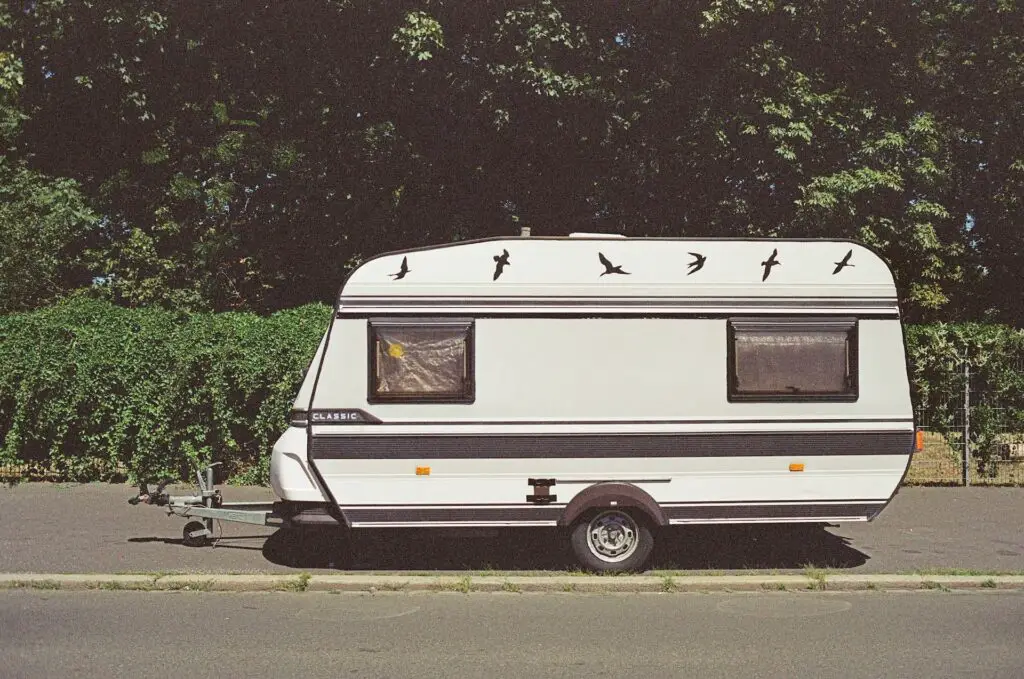Published Date: May 24, 2023
Last Updated on May 25, 2023 by Camper Front
Have you ever dreamt of hitting the open road and exploring the great outdoors in the comfort of your home on wheels? If so, you’re in the right place! In this article, we’ll dive into everything you need to know tol answer the question “What is a travel trailer?”, from various types and features to buying and maintaining your home away from home. So, let’s discover what a travel trailer is and how it can enhance your RV lifestyle.
Table of Contents
Types of Travel Trailers
There are several types of RVs and camping trailers out there, but in this section, we’ll focus on the most popular types of travel trailers you’ll likely encounter on your adventures.
1. Conventional Travel Trailers
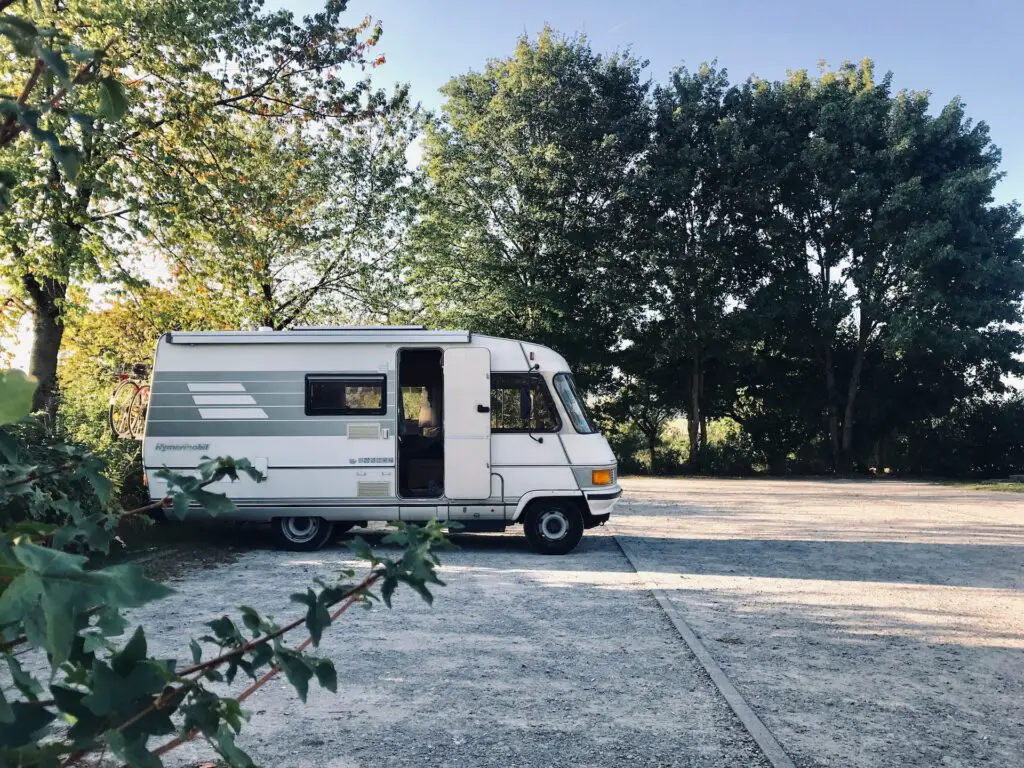
Also known as “bumper pull” campers, conventional travel trailers are towed behind a tow vehicle using a hitch secured to the tow vehicle’s frame. These versatile trailers come in various sizes and layouts, providing a range of options for every type of traveler.
Features
- Can accommodate up to six slumbers
- Basic features like kitchen, bathroom, and sleeping space
- Slide-outs for additional living space
- Towed by a variety of personal vehicles, depending on towing capacity
PROS
- Wide range of sizes and floorplans
- Easier to maneuver than larger trailers
- Detachable from tow vehicle for day trips
CONS
- It may require a more powerful tow vehicle
- Limited off-grid capabilities compared to some other types of RVs
2. Fifth-Wheel Trailers
Fifth-wheel trailers are larger than traditional travel trailers and connect to a pickup truck via a hitch in the truck bed. This unique connection provides greater stability and maneuverability while towing.
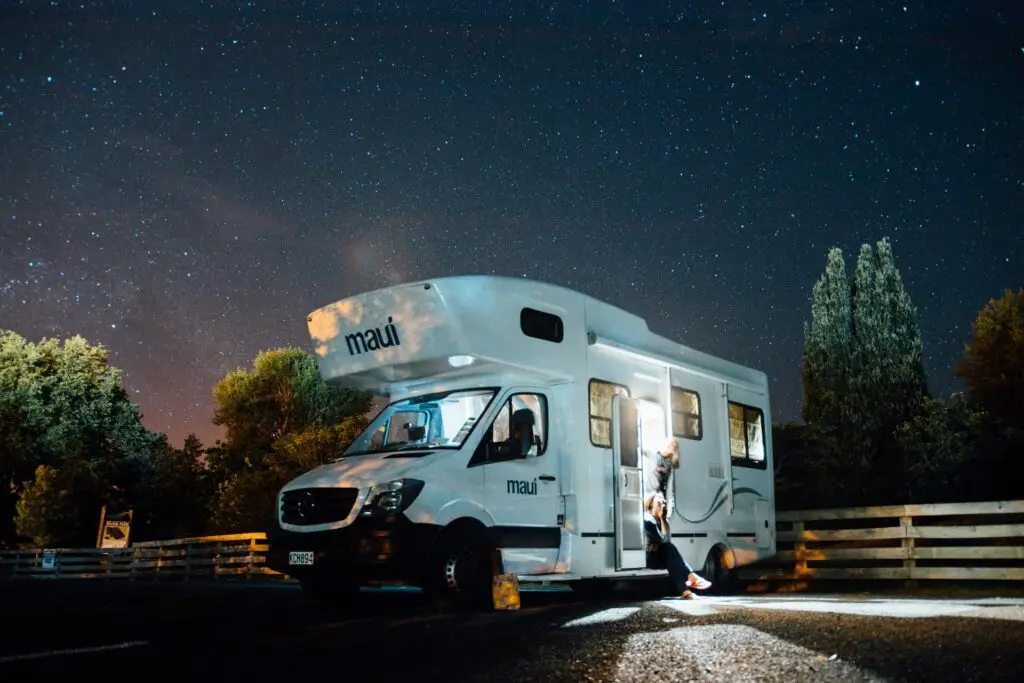
Features
- Spacious and luxurious interiors
- Multiple slide-outs for extra living space
- Separate bedroom and living areas
- Towed by a pickup truck with a special hitch
PROS
- More living space than traditional travel trailers
- Easier to tow and maneuver due to hitch placement
- Increased storage space
CONS
- Requires a pickup truck with a sufficient towing capacity
- Higher price point compared to other travel trailers
3. Expandable Travel Trailers
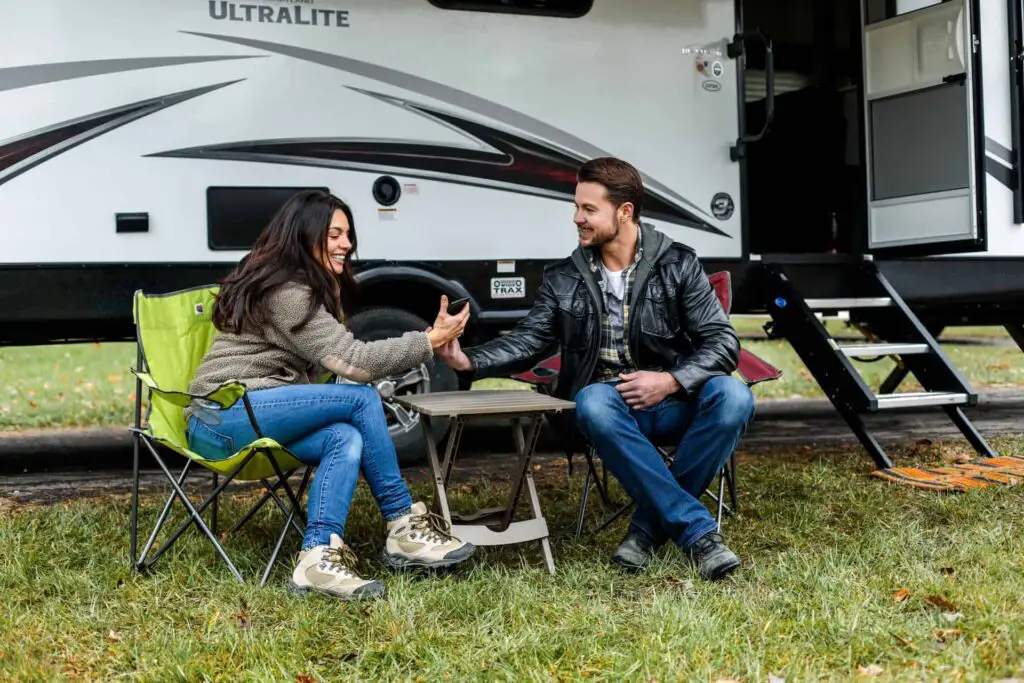
Expandable or hybrid trailers combine the best features of both hard-sided travel trailers and folding camping trailers, making them perfect for those who want a compact, lightweight option with more sleeping space.
Features
- Hard-sided body with fold-out sleeping areas
- Compact size when closed for easy towing
- Sleeps up to six people
- Can be towed by various personal vehicles
PROS
- Lightweight and easy to tow
- More sleeping space than traditional travel trailers of similar size
- Lower price point compared to other travel trailers
CONS
- Limited insulation in fold-out sections
- Less storage space than in hard-sided travel trailers
4. Teardrop Trailers
Teardrop trailers are small, lightweight camper trailers that are perfect for solo travelers or couples who enjoy minimalist camping experiences. Their compact size and unique shape make them easy to tow behind a variety of personal vehicles.
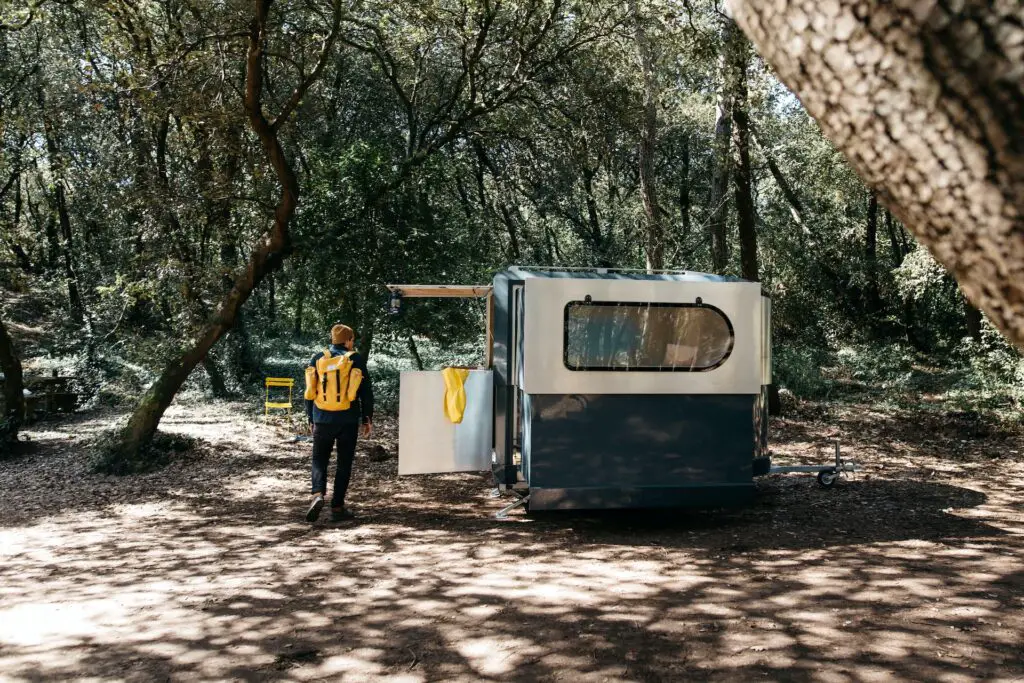
Features
- Compact and lightweight design
- Sleeps up to two people
- Basic amenities like a small kitchenette and sleeping area
- Can be towed by smaller vehicles, such as cars and SUVs
PROS
- Easy to tow and maneuver
- Low price point compared to other travel trailers
- Requires minimal setup at the campsite
CONS
- Limited living and storage space
- Lacks a bathroom and other amenities found in larger trailers
5. Toy Haulers
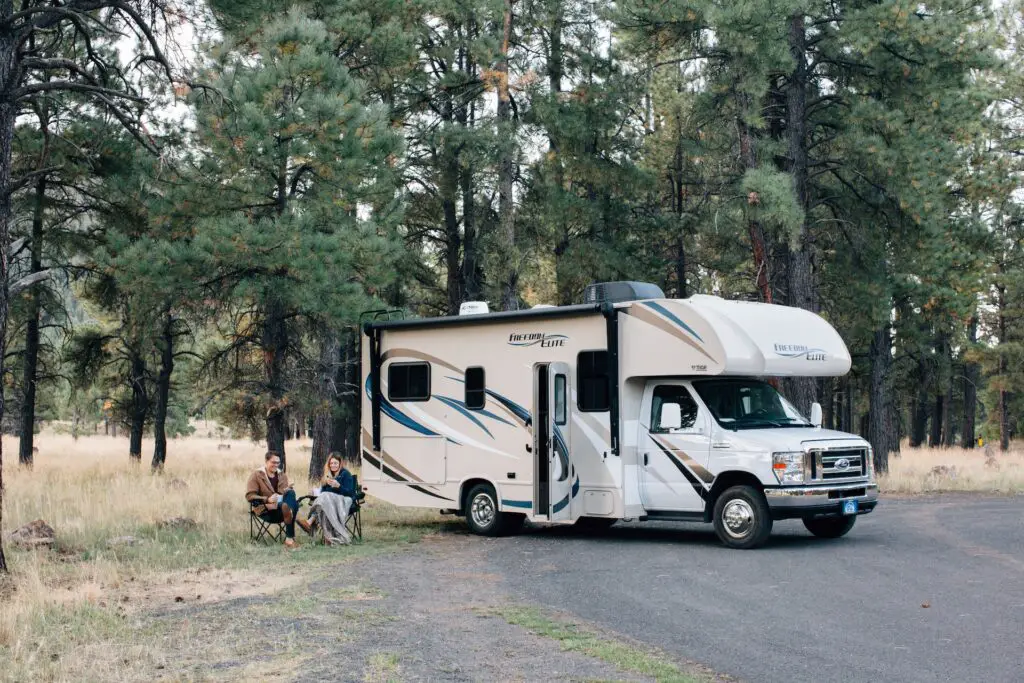
Toy haulers are versatile RV travel trailers designed for adventure enthusiasts who want to bring their ATVs, motorcycles, or other recreational toys along on their trips.
Features
- Built-in garage area for transporting recreational vehicles
- Fold-down ramp for easy loading and unloading
- Living quarters with standard travel trailer amenities
- Typically, larger and heavier than other travel trailers
PROS
- Accommodates large recreational toys
- The versatile garage area can be converted into additional living or sleeping space
- Offers the comforts of home while on the road
CONS
- Requires a powerful tow vehicle
- Higher price point compared to other travel trailers
Advantages of Travel Trailer Campers
Here are some advantages you get while using a travel trailer camper.
• Affordability
One of the primary benefits of travel trailer campers is their affordability. Travel trailers are generally less expensive and have lower operating costs than motorhomes. They do not require a separate engine, which means you can save on insurance, maintenance, and fuel expenses.
• Versatility
Travel trailers offer a range of options, from small teardrop trailers to large fifth-wheel trailers. This variety allows you to find a camping trailer that best suits your needs and preferences. Furthermore, travel trailers can be towed by various vehicles, including trucks, SUVs, and even some minivans, making them accessible to a wide range of potential owners.
• Home Comforts on the Road
Most travel trailer campers come equipped with modern amenities that make life on the road comfortable and enjoyable. These include a kitchenette, bathroom, sleeping quarters, and entertainment systems. The convenience of having your personal space while traveling offers a level of comfort not easily found in other forms of accommodation.
• Ability to Unhitch and Explore
One of the great advantages of a travel trailer is the ability to unhitch your towing vehicle and use it for day trips, errands, or sightseeing. This means you can leave your camping trailer at the campground and explore the surrounding areas without having to pack up your entire home on wheels each time.

Disadvantages of Travel Trailer Campers
• Towing and Maneuverability
While travel trailers offer flexibility in terms of the towing vehicle, they also present challenges when it comes to maneuverability. Towing a travel trailer camper requires practice and skill, especially when navigating tight turns, backing up, or parking. It’s essential to ensure that your towing vehicle has the capacity and features necessary to safely tow your chosen travel trailer.
• Limited Living Space
Travel trailer campers are designed to be compact, which means living space can be limited compared to other types of recreational vehicles. While many travel trailers are cozy and comfortable, they may not be ideal for those requiring ample living space or preferring separate rooms for various activities.
• Maintenance and Storage
Owning a travel trailer means taking on the responsibility of regular maintenance, such as cleaning, checking seals, and inspecting appliances. Additionally, travel trailers require proper storage when not in use, which can be challenging for those who don’t have a suitable space on their property.
• Campground Restrictions
Some campgrounds may have restrictions on the size or type of travel trailers they allow, making it essential to research and plan ahead before embarking on your journey. In some cases, you may need to look for alternative accommodations if your travel trailer camper doesn’t meet specific campground requirements.
Important Features to Consider When Getting a Travel Trailer
When choosing the right travel trailer for your needs, consider the following features to ensure a comfortable and enjoyable RV experience.
Size and Weight
The size and weight of your travel trailer will determine the type of tow vehicle you’ll need and affect your ability to maneuver in campgrounds and on the road.
- Towing Capacity: Make sure your tow vehicle has sufficient towing capacity to safely pull the travel trailer you’re considering. Check the vehicle’s owner manual or consult with a professional to confirm the appropriate towing capacity.
- Size Requirements for Campgrounds: Some campgrounds have size restrictions, so it’s essential to consider your travel trailer’s length and height when planning your RV adventures.
Floor Plan
A well-designed floor plan can make all the difference in your travel trailer experience, so pay close attention to the following aspects:
- Bed Types and Sizes: Ensure there’s enough sleeping space for everyone at your party. Travel trailers offer various bed options, such as queen beds, bunk beds, and convertible dinettes.
- Kitchen Layout: A functional kitchen space will make meal preparation easier and more enjoyable. Look for a layout that offers adequate counter space, storage, and necessary appliances.
- Bathroom Amenities: Some travel trailers feature a full bathroom, while others may have a wet bath (combined toilet and shower) or no bathroom at all. Consider your preferences and needs when choosing a travel trailer with the right bathroom setup.
Storage
Having enough storage space is crucial for a comfortable and organized RV lifestyle. Consider both internal and external storage solutions when evaluating travel trailers.
- Internal Storage Options: Look for travel trailers with ample cabinets, closets, and under-bed storage to keep your belongings organized and easily accessible.
- External Storage Solutions: Some travel trailers offer additional storage space in the form of pass-through compartments, roof racks, or rear storage compartments. These can be useful for storing larger or less frequently used items.
Off-Grid Capabilities
For those who enjoy boondocking or camping in remote areas, having a travel trailer with off-grid capabilities is essential.
- Solar Panels: Some travel trailers come pre-wired for solar panels or even have solar panels installed. Solar power can help you stay off-grid longer by providing a renewable energy source for your RV’s electrical needs.
- Water and Waste Systems: Having larger fresh, gray, and black water tanks allows you to camp off-grid for more extended periods without needing to refill or empty your tanks as frequently. Also, consider travel trailers with composting toilets, as they require less water and allow for longer stays without needing to find a dump station.
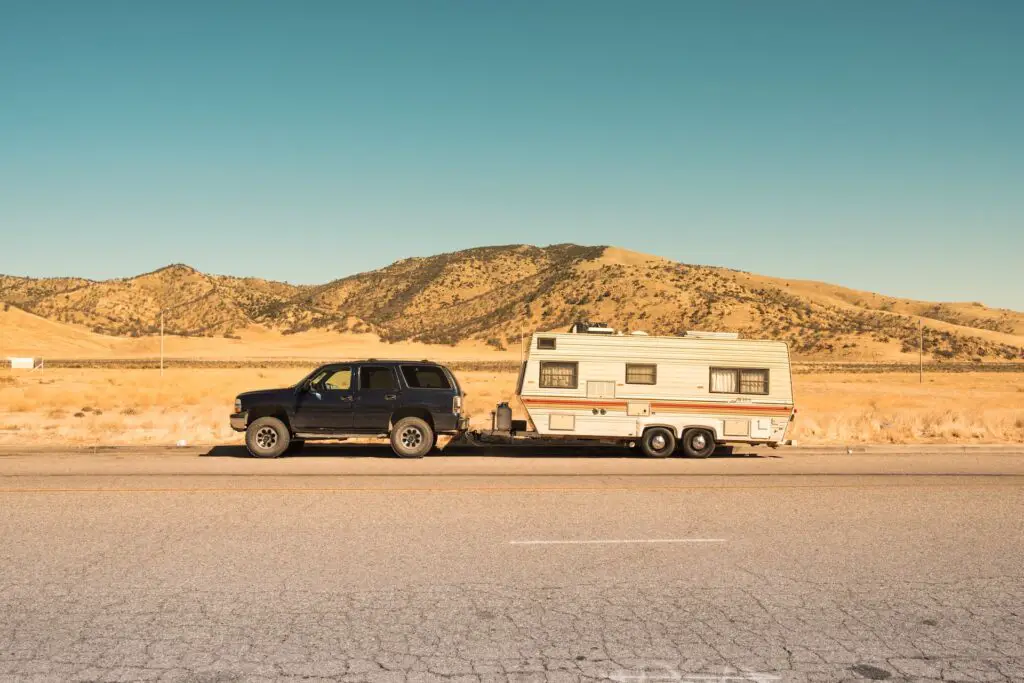
Vehicles You Need to Tow a Travel Trailer
Ensuring that you have the right vehicle to haul your recreational vehicle can make all the difference between a stress-free adventure and a disastrous trip.
Understanding Towing Capacity
Before selecting a towing vehicle for your camping trailer, it’s crucial to understand the Gross Vehicle Weight Rating (GVWR). This figure represents the maximum allowable weight of a fully loaded travel trailer, including passengers, cargo, and fluids. Knowing your travel trailer camper’s GVWR will help you determine the towing capacity required for your towing vehicle.
• Pickup Trucks
Pickup trucks are a popular choice for towing traditional travel trailers and hybrid trailers, thanks to their powerful engines and high towing capacities. With a variety of engine options, bed sizes, and configurations, you can easily find a pickup truck that meets your travel trailer’s specific towing requirements.
• SUVs
Sport Utility Vehicles (SUVs) are another excellent option for towing travel trailer campers. Many SUVs come equipped with robust engines and towing capacities that rival those of pickup trucks. Additionally, SUVs offer passengers more interior space and comfort, making them a suitable choice for families.
• Crossover Vehicles
Crossover vehicles, which combine the features of SUVs and passenger cars, can also be used for towing small travel trailer campers. While crossovers may not have the same towing capacity as pickup trucks or larger SUVs, they offer improved fuel efficiency and a comfortable driving experience. Be sure to check the towing capacity of a specific crossover vehicle before committing to it for your camping trailer needs.
When selecting a towing vehicle, consider the terrain and driving conditions you’ll encounter on your adventures. A four-wheel drive (4WD) or all-wheel drive (AWD) vehicle can provide better traction and stability when towing a travel trailer in challenging conditions.
Tips on Buying a Travel Trailer
Ready to purchase your own travel trailer? Remember these tips and advice to make the best decision for your needs and budget. When buying a travel trailer, you’ll need to decide whether to buy a new or used one. Each option has its features and problems, so choosing the right trailer can save money, time, and extra effort for maintenance.
Buying a Brand-New Travel Trailer
A newbie who doesn’t want trouble after buying a travel trailer would opt for a new product. That way, they can enjoy all the benefits and don’t have to worry about old problems that might occur with a used trailer. Additionally, you get to enjoy new technologies and features, plus some companies offer new trailers in installments, providing flexibility for payments.
Another great benefit of purchasing a new trailer is the manufacturer’s warranty, giving you the option for free repairs as long as the problem lies within the warranty’s range. Furthermore, you can tell the company to customize it per your desire so you can take it anywhere you want without any trouble. This is something you can never get in a used travel trailer.
One of the biggest problems associated with new trailers is their cost; since they are brand new, they are expensive.
Buying a Used Travel Trailer
A person with more experience with a travel trailer who is looking to customize it manually will opt for a used one. They can save a lot of money by purchasing a used trailer, which they can spend on customizing it. Plus, in most cases, the previous owner keeps the trailer in top-notch condition, so you get an almost brand-new product at a lower price point.
On the other hand, the cons of getting a used trailer are that you have a limited or no warranty at all. Also, some people keep their trailers looking top-notch from the front, but they have many hidden issues you only see after using them for a couple of weeks.
Budget Considerations
When setting your budget for a travel trailer, be sure to account for more than just the purchase price.
- Purchase Price: Determine your budget based on what you can afford and consider financing options if necessary.
- Insurance, Taxes, and Registration: When setting your budget, factor in insurance costs, taxes, and registration fees.
- Maintenance and Repair Costs: Set aside funds for routine maintenance and unexpected repairs that may arise during your travel trailer ownership.
Research and Inspections
Before making a purchase, take the time to research different types of RVs, travel trailers, and specific models that interest you.
- Online Resources and Reviews: Utilize resources like RV forums and review websites to learn from other owners’ experiences and gather valuable insights.
- Professional Inspections: If you’re purchasing a used travel trailer, consider having it inspected by a professional RV technician to identify any potential issues or needed repairs.
Dealerships vs Private Sellers
When buying a travel trailer, you can buy it from a dealership or a private seller. Each option has its advantages and disadvantages.
Dealerships: Getting a trailer from a dealership has advantages, like a wide selection of trailers that come with financing and warranty options. In addition, they give you professional guidance and support to find the right trailer for you. However, getting a trailer from dealers comes at a higher price compared to private sellers. Also, since dealers have to sell a car for commission, they might present the car in a way that compels you to purchase the most expensive one.
Private Seller: People prefer to purchase a trailer from a private seller because of the low price. Additionally, the previous owner can give them tips and tricks to utilize the trailer to its maximum potential without doing a lot of maintenance. Plus, you get to know what problems to expect and their optimal solution. However, your selection is limited, and you might not get a warranty from a private seller.
Frequently Asked Questions (FAQs)
1. What’s the difference between a camper trailer and an RV trailer?
RV trailers can be of many types, including campers if you tow an RV behind a car or truck. An RV is a vehicle you drive independently, and a camper trailer is more like an extra vehicle on the back equipped for occupancy.
2. What is the difference between a traditional travel trailer and a hybrid trailer?
The hybrid travel trailer combines a hard-sided travel trailer and a tent camping trailer to have more sleeping room. In contrast, a traditional travel trailer is mostly utilized for traveling, so people need tents to camp in places.
Wrapping It Up
A travel trailer is an excellent choice for anyone exploring the freedom and adventure of RV living. We’ve covered the various types of travel trailers, essential features to consider, tips on buying, and maintenance. Remember, every travel trailer experience is unique, and the key to finding the perfect one is understanding your needs and preferences.
Embrace this exciting journey with an open mind and a spirit of exploration as you create lasting memories on the open road. Stay informed, make well-researched decisions, and always prioritize safety and respect for fellow travelers and the environment.

